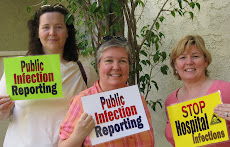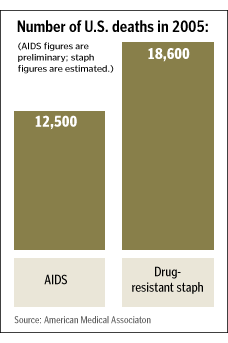Study finds hospital mobile phones transmit message of MRSA
Stressed Out Nurses Weekly, March 16, 2009
A study recently published in the Annals of Clinical Microbiology and Antimicrobials suggests hospital phones could be spreading more than information.
Medical researchers from the Ondokuz Mayis University, located in Samsun, Turkey, tested samples from the hands of 200 ICU and OR healthcare workers from various hospitals, and performed cultures on 200 mobile phones, and found 95% of the phones were contaminated with bacteria including MRSA. Other microorganisms that surfaced have been linked to hospital-acquired infections. The study, which states the bacteria from both examinations was similar, suggests the hospital phones may allow for increased patient-to-patient transmission of bacteria in hospital settings.
In addition, researchers found only 10% of healthcare workers routinely cleaned hospital phones.
Study authors stress the need for healthcare workers to be trained on firm infection control practices, hand hygiene, and environmental disinfection.
They recommend preventative measures, such as regular decontamination of hospital phones with "alcohol containing disinfectant materials" and the use of "antimicrobial additive materials" to cut cross-infection.
Source: Annals of Clinical Microbiology and Antimicrobials
Thursday, April 9, 2009
Hazards: Ambulance Stethoscopes May Pose Risk
The New York Times
By ERIC NAGOURNEY
Stethoscopes carried by ambulance crews are not always cleaned as often as they should be, and as a result they may be exposing some patients to drug-resistant bacteria, a new study reports.
Researchers who looked at stethoscopes used by emergency medical services workers in New Jersey found that a significant number carried methicillin-resistant Staphylococcus aureus, bacteria known as MRSA that are resistant to standard drugs.
Some of the ambulance workers could not recall the last time the instruments had been cleaned, said the researchers, whose report appears in the current issue of Prehospital Emergency Care.
The study’s lead author, Dr. Mark A. Merlin of Robert Wood Johnson Medical School, said it was unclear how big a threat MRSA on a stethoscope posed to a patient. But as incidents of infection by the bacteria become more common, and with the possibility that it will become more resistant to antibiotics, it is important to reduce its spread, he said.
Researchers asked ambulance crews arriving at an emergency department over a 24-hour period to let their stethoscopes be tested. They also asked when the instruments had last been cleaned.
Of 50 stethoscopes tested, 16 had the bacteria, which a simple alcohol swab is usually enough to kill, the researchers said. “The concept of cleaning an entire ambulance after every patient is not practical,” they wrote. “Cleaning a stethoscope, however, is not labor-intensive, does not require much time, and does not require any special equipment beyond currently stocked items.”
By ERIC NAGOURNEY
Stethoscopes carried by ambulance crews are not always cleaned as often as they should be, and as a result they may be exposing some patients to drug-resistant bacteria, a new study reports.
Researchers who looked at stethoscopes used by emergency medical services workers in New Jersey found that a significant number carried methicillin-resistant Staphylococcus aureus, bacteria known as MRSA that are resistant to standard drugs.
Some of the ambulance workers could not recall the last time the instruments had been cleaned, said the researchers, whose report appears in the current issue of Prehospital Emergency Care.
The study’s lead author, Dr. Mark A. Merlin of Robert Wood Johnson Medical School, said it was unclear how big a threat MRSA on a stethoscope posed to a patient. But as incidents of infection by the bacteria become more common, and with the possibility that it will become more resistant to antibiotics, it is important to reduce its spread, he said.
Researchers asked ambulance crews arriving at an emergency department over a 24-hour period to let their stethoscopes be tested. They also asked when the instruments had last been cleaned.
Of 50 stethoscopes tested, 16 had the bacteria, which a simple alcohol swab is usually enough to kill, the researchers said. “The concept of cleaning an entire ambulance after every patient is not practical,” they wrote. “Cleaning a stethoscope, however, is not labor-intensive, does not require much time, and does not require any special equipment beyond currently stocked items.”
Subscribe to:
Comments (Atom)








